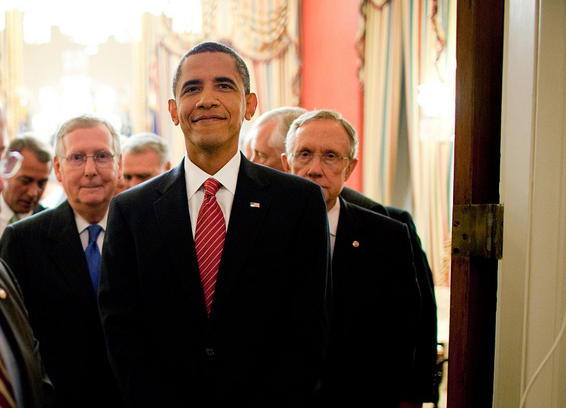About a year ago, President Obama kick started the health care debate by hosting a bipartisan summit designed to build momentum for what he hoped would be his signature domestic policy initiative. The March 5, 2009 meeting was marked by pleasantries, and engagement between Republicans and Democrats–and that figured. Republicans were facing a popular President, pushing a popular initiative, in the aftermath of a big victory on the stimulus bill.
Fast forward to February 2010, and a lot of people in Washington–liberals, Democrats, even some pundits–are asking a question: Why is President Obama wasting his time with yet another summit. After all, he tried this a year ago and…well, just look how well that’s paid off.
Times have changed, though. And now Democrats see an opportunity not so much for bipartisan co-operation, but for the President to magnify the differences between his own party, and the hell-bent-on-obstruction GOP. Whether they’re right or wrong, though, the politics have simply changed. After a year of smears and bad faith, with Republicans locked into opposition, this month’s summit simply won’t be a redux of the same event.
Take Sen. Chuck Grassley (R-IA)–ranking member on the Senate Finance Committee. Here’s what he said to Obama at the time: “I think you served with us in the Senate long enough to know that Max Baucus and I have a pretty good record of working out bipartisan things.”
Neither one of us–or neither one of our parties–get everything that they want. But we’ve had a pretty good record, I think. Only two bills in eight years that haven’t been bipartisan. So we have a process in place that has hearings coming up, has a process of getting round-table discussions, getting stakeholders in, getting authorities in. And we expect to have work on this in the committee in June….
There’s a lot of us that feel that the public option, that the government is an unfair competitor. And that we’re going to get an awful lot of crowd out. And that we have to keep what we have now strong and make it stronger.
As the health care fight dragged on, of course, Grassley became one of the leading critics of reform. He moved on from the public option (“a predator, not a competitor”) to adopting “death panel” rhetoric, to questioning the Constitutionality of the individual mandate–a policy he once supported. As the leading Republican on the Gang of Six, he dragged health care discussions way past June, before affirming his opposition, and attacking the bill he’d committed to working on in withering terms all the way until it finally passed the Senate (sans public option) on Christmas eve.
It wasn’t just Grassley, though. Rep. Roy Blunt (R-MO) similarly took issue with the public option, and with comparative effectiveness research as well. And Senate Minority Leader Mitch McConnell said he’d like to see congress reform Social Security, too, as part of a grander entitlement reform agenda.
In the months ahead, McConnell would give the Democrats’ plan a pet name–“monstrosity”–and now says he’s perfectly happy to deal…so long as Democrats throw all their hard work away.
“If we are to reach a bipartisan consensus, the White House can start by shelving the current health-spending bill,” McConnell said in an official statement. “There are a number of issues with bipartisan support that we can start with when the 2,700-page bill is put on the shelf.”
Likewise, Rep. Eric Cantor (R-VA), says Democrats might as well not waste their time unless they’re willing to pass a Republican-themed bill alone. According to Cantor, “House Republicans have offered the only plan, that will lower health care costs, which is what the President said was the goal at the start of this debate.”
Yes, both last year’s event and this years are billed as “health care summits”. But beyond that, it’s really an apples to oranges comparison.










